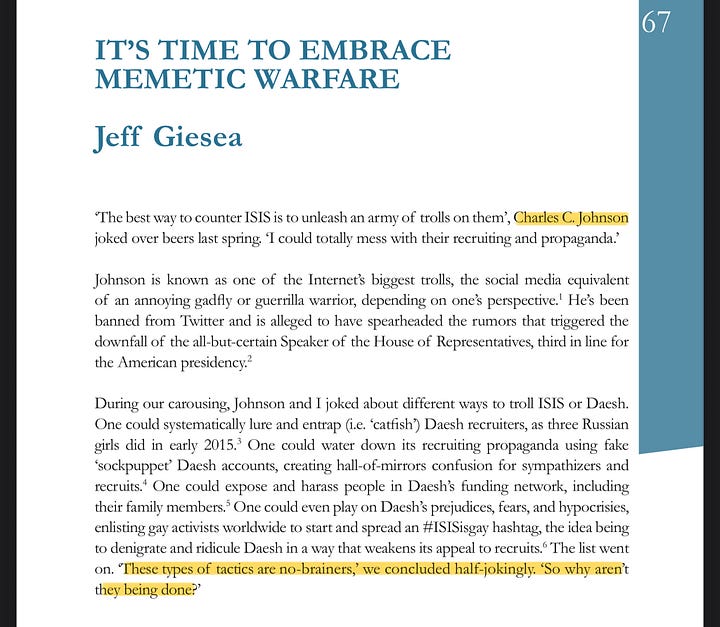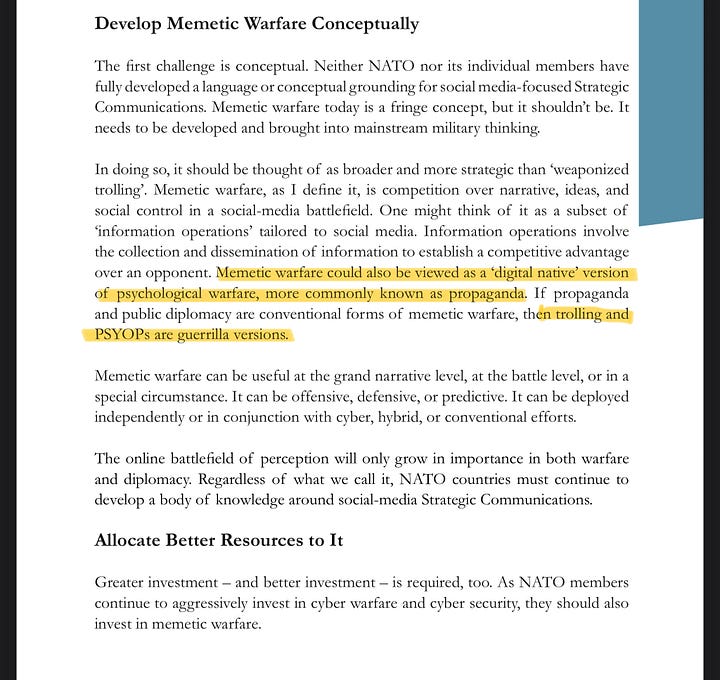One Simple Trick For Protecting Your Mind
Just because it makes you feel good, doesn’t make it true
For a solid decade, the information environment, particularly in the US, but not limited here, has been engineered with specific political, cultural and electoral goals. Social media, an oxymoronic term in many ways, is effectively a giant trap for the minds of the people who inhabit it, for however much of their day.
I’ve written a lot about this from the perspective of psychological warfare and propaganda, but I think there is a basic tool that some people have and some people don’t, that doesn’t require any sort of education at all to grasp.
Just because it makes you feel good, doesn’t make it true.
This may seem incredibly pedantic, silly to even mention, but I cannot emphasize enough that if we could teach kids from a young age that their emotions and the world do not necessarily match up, we would have a lot less ignorant people.
Simple example. My son loved trains and his mom took him on a special outing to ride on one when he was five or so. BUT, as soon as the train took off, a clown came on board. The horror. What ensued was a titanic meltdown that, despite the clown getting the message and going to another car, threatened to ruin the train ride for everyone.
My son apparently had the misapprehension that clowns were actually another type of creature from humans, aliens if you will. That’s a scary thought, right? Well, once calmed down to the point that rational thought could take over, he was informed that it was just a regular guy in makeup. “Oh, ok. That’s funny.”
He was being taught the skill that just because that person feels scary, it doesn’t make them actually a threat. The same goes for things that make you feel good but shouldn’t be trusted. Here’s another familiar way to put it.
Don’t take candy from strangers.
Again, duh. This seems obvious. But this is what happens billions of times a day. People around the world, on Twitter, Facebook, TikTok, cable TV or wherever they are, take candy in the form of lies from strangers that make the people feel good, which they mistake for being a sign of being real.
One of Peter Thiel’s major influences is René Girard, a French philosopher who promoted a belief system centered around the concept of mimesis.
Mimesis is a term used in literary criticism and philosophy that carries a wide range of meanings, including imitatio, imitation, similarity, receptivity, representation, mimicry, the act of expression, the act of resembling, and the presentation of the self.
Girard’s ideas are a strange syncretic mixture of philosophy, theology, eschatology and psychology but his theory of how desire leads to mimesis, or imitation, is quite powerful and provided Thiel with ideas for how to accomplish his goals of using technology to achieve political results.
Girard's main contribution to philosophy, and in turn to other disciplines, was in the psychology of desire. Girard claimed that human desire functions imitatively, or mimetically, rather than arising as the spontaneous byproduct of human individuality, as much of theoretical psychology had assumed.
The idea behind memes is fundamentally related to mimesis and it is no coincidence that many of the people Thiel funded over the last decade have been the primary creators and promoters of right-wing, anti-democratic, racist, misogynist memes.
White nationalist Jeff Giesea, who has known Thiel since the 1980s, worked for him for many years, and managed Thiel’s PAC MAGA3X during the 2016 election, wrote this paper in 2017 pitching the idea of “memetic warfare” to NATO.
“Memetic warfare could also be viewed as a ‘digital native’ version of psychological warfare, more commonly known as propaganda. If propaganda and public diplomacy are conventional forms of memetic warfare, then trolling and PSYOPs are guerrilla versions.”


But what is a meme, really? And how do they work? In the context of mimesis it’s not so much the recipient that memes are for, memes are really for the sender. Memes make the sender feel good by “owning the libs” and showing off how radicalized or “based” they are. The goal is to get someone else to want to feel that way too and send it themselves.
And this is where the crux of our problem lies. An adult, or a child, who has been taught how to disambiguate their emotions from reality would hesitate before sharing a meme that makes them feel good but doesn’t line up with their values. A person who hasn’t had this type of learning, a kind of emotional intelligence, will just share it anyway.
Donald Trump, and malignant narcissists in general, are missing this crucial part of their psychology: the ability to feel an emotion and decide to do something different anyway. That’s why Trump’s “policies” aren’t policies at all, they are just expressions of his own emotions, which can vary immensely over short periods, or by whoever the last person he talked to is. If the last person makes him feel better than the person before that, Trump simply constructs a new reality to match the new emotion.
Elon Musk bought Twitter for the purpose of creating an alternate reality where saying the most disgusting, sadistic things possible about Democrats and liberals make people feel good, because there are lots of accounts that reward them for it, emotionally. This is also an important component of Soviet reflexive control, which is a well-used paradigm for achieving large-scale mind control over a population.
The missing tool for too much of the world is the filter that prevents them from immediately assuming their emotions are facts. Or, to put it another way:
Facts don’t care about your feelings.
Ironically, of course, this is a phrase mostly used by the very people that don’t actually understand this truism. When facts and feelings merge, it’s time to remember one last quote:
“Those who can make you believe absurdities, are those who can make you commit atrocities.”
Voltaire, 1768
Thanks for your support!





Interesting!
This is my reminder of the 5 word remembrance of Trump thinking he’s cognitively a genius.
He’s apparently good in the moment but if he had to sit for two days of neuropsychiatric testing he’d be in the lowest of percentiles.
Is his base the same? Do we expect him to be above the norm? Do people want to be stolen?
In executive functioning the ability to set shift is one of the most important functions that require memory, focus, multi function systems that allow for flexibility. He’s lacking in those and I believe always has been.
Train AI how to influence these systems in a person is creating what they envision. The humanoid.
I said yesterday creepy and that’s juvenile but truly it is stealing the brains capabilities to the lowest level based on that emotion versus learned functioning through skill building or AUTONOMY. They don’t want this.
Didn’t the Koch bros spend something near two decades at some university to replicate the Russian way of propaganda? Cambridge even. I can’t remember.
It is mind war with an unsuspecting audience that is vulnerable from never knowing life outside the computer and internet.